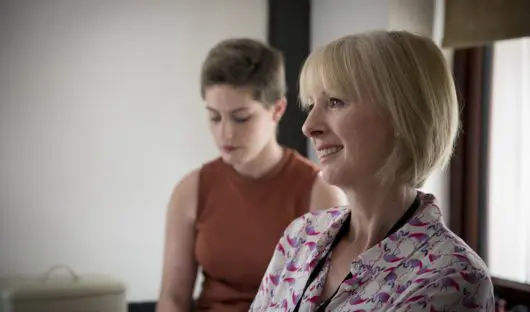Staying in hospital
The worst part about hospital is that it can be B-O-R-I-N-G. If you have to stay in for long stretches of time, you're going to need to pack the real essentials, have plenty of entertainment on hand and learn how to look after yourself on the ward.
Packing the essentials
Ok, so hospital packing isn’t exactly holiday packing but it’s similar in principle. You need stuff for comfort, stuff to keep you connected and stuff to combat the boredom. These are some of the things that other people said were vital to their hospital stays.
- Something snuggly for your feet like slippers or slipper socks
- Comfortable clothes like baggy t-shirts and joggers
- Smartphone or tablet. Download an array of games, apps, digital books or podcasts to keep you busy
- Charger. Never forget the charger
- Puzzle and activity books. Mindfulness colouring books are so the rage right now
- Favourite snacks or drinks
- Headphones to listen to videos, music, audiobooks or podcasts – if you’re listening on a smart device, pre-download them or make them available offline in case you have problems with the internet connection in hospital
- Or go retro with an MP3 player, hand-held games console or portable DVD player
- Essential toiletries. Moisturisers, hand cream and lip balm can be especially handy
- Notebook and pen
- Some cash in case there’s anything you need from the shops – or you fancy a decent coffee!
- Books and magazines
- Photos or anything precious you want to have near you – especially something that makes you smile.
Boredom-busting activities and entertainment
Being in hospital can be very tedious. It’s normal to want to switch off. You might not think it but boredom can actually affect your mood and make you feel low. While it’s important to allow your body to rest, keeping your brain active will give you something positive to focus on.
Our ideas below feature free or cheap online courses and apps which you can dip in and out of. Master online coding, get knitting, learn Spanish, improve your creative writing or start yoga – there’s something for everyone!
Coursera
Through Coursera, you can complete courses hosted in universities around the world. You can access video lectures, tutorials, assignments and peer support. You can even complete full degrees through the app! There are costs involved with some courses – anything from £15 to £25,000. Some content is available for free, though. Go forth and learn.
Derby University
The University of Derby has a free, online hub. All the courses have undergone a thorough academic quality reviewing process. These courses would make a great addition to your CV and require a commitment of two hours per week, for six weeks. On completion, you will be issued with a snazzy E-Certificate.
FutureLearn
Owned by The Open University, this online learning platform called FutureLearn has an extensive course list for you to browse. There’s a diverse range of subjects that vary in length. Most are six to ten weeks long but some are shorter. Each has weekly tests and quizzes, and there may also be an opportunity to complete an assignment or final exam. Score 70% or higher and you can buy a Certificate of Achievement, with the logos of the university and organisations associated with your course. Filmmaking, forensic witness, robotics, business – get started on whatever floats your boat.
Lynda
We don’t know why it’s called Lynda, but we do know that it can help you learn business, software, technology and creative skills. It’s designed to help you achieve personal and professional goals through a video library of top quality courses taught by recognised industry experts. These can then be used on your CV or LinkedIn. There are a whopping 4,000 courses on anything from business to photography. It does come at a cost though – £15 per month (although there’s a free trial).
Coding is the language of the internet and could open a range of opportunities both professionally and personally. Codeacademy offers interactive online tutorials in computer programming languages like HTML, Python, Ruby and Javascript. It can teach you to create your own webpages and interactive designs.
For the creative soul, Craftsy is the perfect one stop shop to learn different arty skills. From quilting and knitting, to cake decorating and paper craft, you learn via high definition interactive video tutorials and downloadable workshops. Some classes have a cost associated but others are completely free. You can even purchase kits to go along with the classes (or just get a friendly person on your ward to help source the materials you need). Classes include bag making, wirework jewellery and loads more.
Master the languages of the world, with a friendly, green owl to guide you on your way. Duolingo will help you to write, speak and understand other languages like a game. Progress through levels and even add achievements to your LinkedIn profile. You can download the app to your Android or iPhone and play in your own time. There are loads to learn! Spanish, French, German, Italian, Portuguese, Dutch, Russian, Swedish, Polish, Ukrainian, Hebrew, Vietnamese, Swahili, Hindi, Korean and Klingon… yep, really!
Elevate is a brain training programme designed to improve attention, speaking skills, processing speed, memory, math skills and more. Each person is provided with his or her own personalised training programme that adjusts over time to maximise results. One study has shown that brain training apps can even help with ‘chemobrain’!
Adriene is an online yoga instructor who has run a YouTube channel from her home since 2013. She has 30 days of yoga videos to help deepen or kick-start your yoga practice. Some research has shown that yoga helps to reduce distress, anxiety, depression and fatigue in cancer patients. It also helped to improve quality of life, and emotional and social wellbeing.
If you consider yourself more of a fully fledged yoga master, there is also a free app called Down Dog. It talks you through sequences of different poses for that ‘studio’ experience.
Fancy yourself the next Hendrix? Justin Guitar has hundreds of free lessons for those who have never played before, right up to those who have a basic knowledge. Dip in and out as much as you want. All videos are free, with an app on its way soon!
It’s very important to keep yourself entertained and try and keep your brain active because it’s so easy just to switch off and just try and sleep the whole thing through.
Managing visitors on your terms
Seeing the people you love can also make a massive difference. Check with your hospital how visiting works. If there are no fixed visitor times, planning for people to drop in at different points throughout the day can break up your time and can make days pass quicker. It will also help to avoid visitors turning up at the same time and not being able to spend quality time with anyone.
There will no doubt be days when you feel too tired to see people, or just can’t deal. That’s totally fine – it needs to be on your terms. Ask friends and family to text before they come so you can manage who comes and when.
Stay connected
Many of us are used to having social media, emails, videos, search engines, online games and entertainment at our fingertips. Having access to all of this can feel even more important in hospital and it’s frustrating if you can’t get online. Some hospitals will offer wifi but if it’s too expensive or you don’t have access, you could check your phone’s data plan or buy a dongle or SIM card.
Looking after yourself
Regular, gentle exercise is often encouraged throughout cancer treatment. You’ll probably be warned off rugby and mountain climbing for the time being, but there’s plenty of other ways to keep your fitness level up. This will help you feel better in your body and mind – and give you something to do! Win, win, win. Talk to your team for some ideas. There might even be fitness programmes or classes going on at your treatment centre.
Eating well is also part of taking responsibility for your own health and wellbeing. You’ll be provided with meals where you’re treated, although your family and friends will have to make their own arrangements. Some wards now have their own chefs, which means you may be able to choose what to eat and when.
Take notice of how you feel and follow advice from dietitians. Some ward food might not feel particularly appealing while you’re being treated, so check with your ward you or someone else can bring food in. Also, make sure to tell the staff if you have particular requirements, like kosher, halal, vegetarian or gluten-free.
You might also like to read
Going to hospital for the first time
A guide to going to hospital for the first time and what you can expect as a young person.
Find out more
Taking control of your care
How to feel more in charge of what's happening to you and knowing who to talk to.
Find out more
Body image and cancer treatment
Dealing with changes to your body can knock your confidence. Here's how to boost your self-esteem.
Find out more